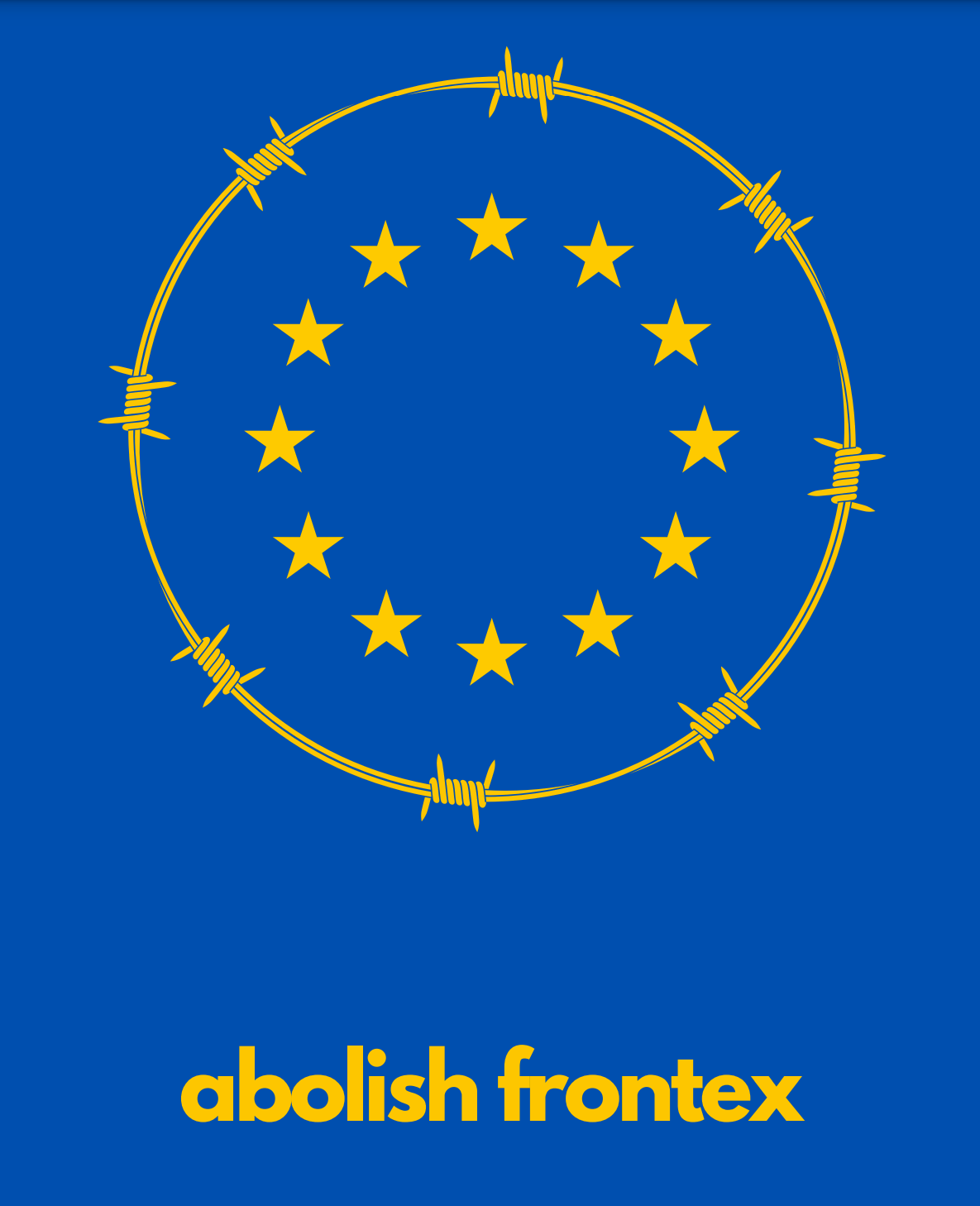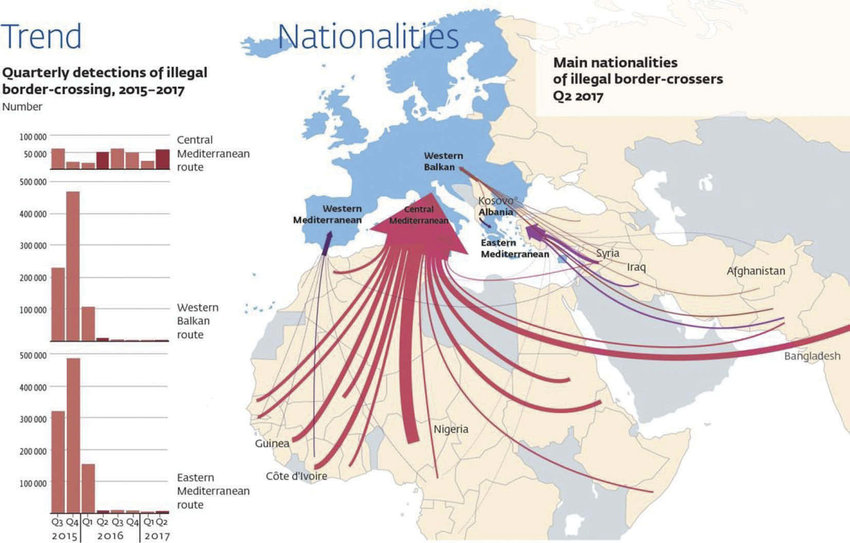Originally appeared at: https://blogs.law.ox.ac.uk/blog-post/2023/04/frontex-campus-interview-professor-michele-lancione
Thanks to Maurice Stierl for the care and support.
Frontex off Campus! An Interview with Professor Michele Lancione
Michele Lancione works as a Professor of Economic and Political Geography at the Polytechnic University of Turin. In July 2021, he discovered that his university had agreed to produce maps and infographics for Frontex in order ‘to support the activities’ of the agency. Since the foundation of the border agency in 2004, these ‘activities’ have been pivotal in securitising and militarising EU borders. Many have argued – including myself – that they have also relentlessly produced the ‘migration crises’ Frontex claims to combat.
Over recent years, Frontex has faced a series of investigations into its activities, not least for the agency’s implication in serious human rights violations at the EU’s external borders. When Professor Lancione approached the university after learning of the cooperation and asked to end its contract with the agency, he was told that the project was simply producing ‘harmless data’. In this interview, we speak about his struggle to get Frontex off campus.
Posted

Maurice Stierl: How did you find out about the collaboration between your university and Frontex, and what happened when you raised your concerns?
Michele Lancione: I first learned about this collaboration in a departmental meeting in July 2021. I had joined the department only four months earlier and was surprised. There was little reaction when I raised my concerns. Very few of my colleagues became allies in the fight to stop the agreement with Frontex. Some knew little about the EU border agency. Despite all existing evidence, including on Frontex’ cooperation with the so-called Libyan coastguard to violently intercept migrant boats, they seemed detached from the issue. For others, I suspect, it was simply easier to stay calm and let things go. Most academics in Italy don’t speak out against their institutions. And a solid critique takes time and energy. Some probably told themselves, ‘our colleagues are just doing harmless maps – what is wrong with that?’
Another issue is that this is not the university’s only problematic relationship. The Polytechnic University of Turin also works with defence contractors, for example. So, it is not just about Frontex. The agreement with the border agency needs to be understood as part of a larger cartography of militarisation in which my university, and the European academic sector at large, plays a role. The agreement with Frontex has persisted despite critique as the university is scared that if they end the agreement, this might open Pandora’s box, leading to other agreements, such as those with defence contractors, to be scrutinised and challenged.
Stierl: Was there no discussion about the potential harm that could result from collaboration between researchers and border enforcers?
Lancione: No. Instead, the collaboration was presented as proof of the department’s ‘research excellence’. But what my colleagues are doing is not research. It is essentially service provision. Frontex asked for maps, my department agreed to deliver maps using data that is either open source or provided by Frontex. The problem is that maps are never neutral. Indeed data, any kind of data, is never harmless. Frontex’s maps commonly show big red arrows that point from Africa to Europe. These supposedly indicate migration flows, but they produce a sense that we are under siege by threatening migrants landing on Italian shores.

Clearly, Frontex has a vested interest in generating this feeling. It depends on the political legitimisation it receives from EU member states, which is rooted in the idea that Europe must be defended against unregulated migration flows. When a university like mine assists in creating such maps, it gives them scientific credibility and legitimacy.
Stierl: You’ve written that a campaign is emerging in response to Frontex coming ‘onto campus’. What has happened so far?
Lancione: The department was a tense place for me after I released a public statement and gave some interviews in autumn and winter of 2021. But I also received positive reactions and solidarity. Some colleagues joined me in taking a public stance against the collaboration. Students also voiced their strong opposition, and many groups fighting against Frontex across Italy and Europe got in touch. I used this moment to get in touch with European campaigners trying to abolish Frontex, and to learn more on the agency’s activities.
One of the most memorable encounters was with workers from the port of Genoa and their union. For a very long time, they have struggled against companies whose ships offload weapons in the port. At times they have even blocked ships from landing. To them, fighting against Frontex means fighting against the militarisation of our societies. This is a struggle that must unite workers across economic sectors, because the military – as a form of industry and culture – cuts across multiple domains of life.
Stierl: Were there any risks for you to engage in this sort of campaign against your employer? Is there a potential price to pay for being an ‘outspoken scholar’?
Lancione: Not really. As a full professor, I can ‘afford’ to take a stance. But I have received my fair share of negative reaction. Some colleagues are not talking to me anymore. The head of department is not responding to me. Very high-ranking members of my university have expressed the need – in private university meetings – to ‘get rid of that anarchist’. I am fine in being labelled as such. But they won’t get rid of me, or of the others fighting for a more just university, very easily.
Stierl: On your blog, you wondered: “Can I carry [out] ‘ethical’ research work, if my Institution is doing affairs with a third party who is involved in the systematic violation of human rights?” Have you found an answer to this difficult question?
Lancione: Unfortunately, and I said this to my students recently, being an academic nowadays means being an institutionalised being. One has to, evoking AbdouMaliq Simone, work within and beyond the capture of the institution. For me it’s important to show our students that we are not just here accepting everything. That we don’t just talk about critical thinking in our seminars, but that we take active stances out there in the world and within our institutions. It is too easy to claim to be an activist ‘out there’, but to fail to look at the structures that you work within.
Working within an institution such as a university – any university, not just mine – is clearly a compromise. But it allows us to use the privileges that come with the job for political purposes. Doing so doesn’t constitute a deviation of what the academy should be – it is the essence of being a public intellectual. The work must start within. The classroom is a fantastic place to fight for the betterment of our world. To use one’s voice to imagine and create more just futures.
Stierl: What are the next steps?
Lancione: There are no major next steps in the campaign at the moment, because I think the agreement is sealed. It will be very hard to get the university to vote against it, since they already voted twice to maintain it. Personally, I am shifting this campaign into my own teaching. I hope to engage with students about the role of universities in militarisation. I also have a book coming out in July that is specifically addressed to students. Hopefully it will be seen as a guide on how to deconstruct universities’ problematic relationships. I hope it inspires them to start organising once more, with renewed energy an awareness.
How to cite this blog post (Harvard style):
M. Stierl. (2023) Frontex off Campus! An Interview with Professor Michele Lancione. Available at:https://blogs.law.ox.ac.uk/blog-post/2023/04/frontex-campus-interview-professor-michele-lancione. Accessed on: 28/04/2023

